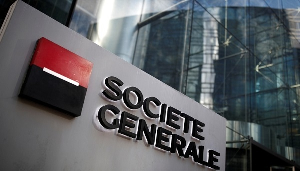 Societe Generale entered Ghana in 2003
Societe Generale entered Ghana in 2003
Banking consultant, Dr. Richmond Atuahene, has indicated that contrary to what he describes as English, the data on Ghana’s banking sector depict a sector that has been in a state of crisis for the past ten years.
He made these assertions in an interview with Francis Abban, host of State of Affairs on GHOne TV, while discussing Societe Generale’s announced exit from Ghana after twenty years of operation.
Referring to Ghana’s banking sector's non-performing loans, which have averaged about 16.5% in the past ten years, the banking expert insisted that there was abundant literature from the International Monetary Fund to prescribe a fully-fledged crisis situation for Ghana’s banking sector.
Dr. Atuahene pointed out, “Since 2014, our non-performing asset ratio has hovered between 11% and 24.9% as of December 2023. If you use this to test the resilience of the sector, it is completely not resilient.
"There is literature written by IMF staff in 1998. It states that any banking sector that has more than 10% non-performing assets can be described as a fully-fledged banking distress or crisis,” he explained.
Data from Ghana’s Banking Sector performance put year-on-year NPLs at 11% in 2014; 14.7% in 2015; 17.6% in 2016; 22.7% in 2017; 18.2% in 2018; 14.7% in 2019; 15.7% in 2020; 15% in 2021; 15% in 2022, and 24.9% in 2023.
Richmond Atuahene argued that the Domestic Debt Exchange Program and the government's failure to pay arrears owed to contractors have contributed significantly to exacerbating the situation further, rendering indigenous banks unable to secure a firm position against their foreign competitors.
No chance for local banks:
Analyzing the likelihood of local banks taking advantage of the exit of a foreign bank to expand, Dr. Atuahene ruled out the possibility, insisting that indigenous banks, both privately owned and state-run, lacked the stability and muscle to be bidding for the spoils.
He further revealed that the Ghana Amalgamated Trust, created to advance some transfers to help five banks that survived the banking sector clean-up meet their minimum capital requirements, had rather saddled the banks with high costs of servicing the transfers.
“In 2019, when the GAT came in, everybody thought it was going to lend money to the banks at a reasonable price. You will be shocked to learn that the amount of money given to them and the cost of that money alone is killing the banks. If you are giving someone subordinated capital, you are not supposed to put a bond rate on it,” he opined.
GAT Plc was set up in December 2018 as "an urgent" policy response to help support five local banks: Agricultural Development Bank (ADB), OmniBSIC, Prudential Bank, Universal Merchant Bank, and National Investment Bank (NIB), "as they were unable to raise equity to meet the Bank of Ghana’s new mandatory minimum capital requirement (MCR) of GHS400 million by 31 December 2018."
Multinationals fleeing:
Dr. Richmond Atuahene indicated that although it was worrisome that multinational brands, including Glovo, Nivea, Jumia Foods, Game, Bic, and a host of others, had folded up their operations in Ghana in the past three years, the signs were on the wall.
He observed that most conglomerates would be uncomfortable doing business in Ghana, considering the country's unfavorable macroeconomic indicators, which remain wobbly compared to the country's neighbors in the Sub-region.
“When you are a multinational going to invest, you look at macroeconomic stability, which includes a fairly stable currency, lower inflation, fiscal deficit control, a manageable public sector debt, a positive balance of trade, etc. All these indicators do not look very good.
"They have shareholders to pay. If I invested US$100 million in Ghana in the year 2019 when the cedi was 5.17 to a dollar, today the cedi is 14 cedis. If I made the same investment in La Cote D’Ivoire, where the currency has been fairly stable, I would prefer to go there to invest. After all, I am looking for good returns. I am not just a social company. I will have to pay my shareholders a return commensurate with their investments in the company," he pointed.
Government action:
The banking expert challenged the government to go beyond the rosy speeches crafted to soothe political egos and rather take a critical look at the factors chasing out Foreign Direct Investments (FDIs) in Ghana.
“The managers of the economy should sit up and stop thinking all things are fine. I recently heard one of the ministers say that Ghana is the best place to do business.”
"If the IMF had not promised us this $360 million, I wonder where the cedi would have been. I think the managers of the economy should be looking at a comprehensive plan to address some of these factors informing these multinationals to move," he advised.
Background
The French Bank Société Générale is not only exiting Ghana but is also pulling out of other African nations, namely Tunisia and Cameroon.
Investment bank Lazard has been engaged to explore potential buyers for its subsidiaries in the three countries.
As more European Banks cease their operations on the African continent, industry watchers are tipping Nigerian and South African Banks to emerge as the strongest players on the continent.
Watch the latest edition of BizTech below:
Ghana’s leading digital news platform, GhanaWeb, in conjunction with the Korle-Bu Teaching Hospital, is embarking on an aggressive campaign which is geared towards ensuring that parliament passes comprehensive legislation to guide organ harvesting, organ donation, and organ transplantation in the country.
Click here to follow the GhanaWeb Business WhatsApp channel